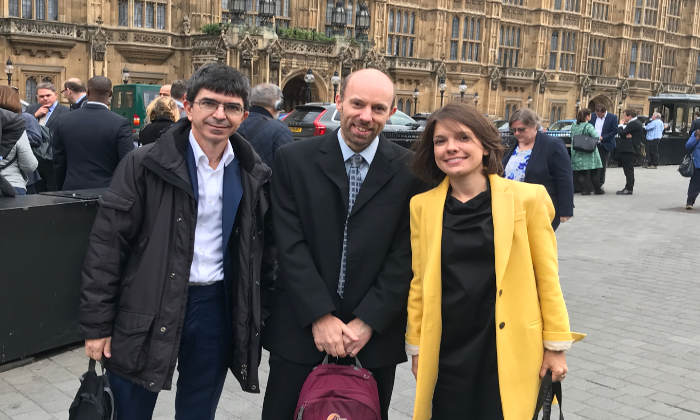Manchester Academics visit the House of Lords regarding Responsible AI
23 Oct 2018
Manchester Academics visit the House of Lords to make the case for continued Government support into the development of Responsible AI

This week, Dr Barbara Ribeiro, Prof. Angelo Cangelosi and Prof. Barry Lennox travelled to the House of Lords to meet with Lord Puttnam and Lord Giddens to discuss AI and the field of Robotics. The meeting was arranged with the support of Policy@Manchester as part of their engagement programme.
Dr Ribeiro commented:
“The meeting has served to strengthen the links between colleagues from the AMBS and the Schools of Computer Science and of Electrical and Electronic Engineering. I think the urgency and importance of interdisciplinary collaborations in the field of AI was one of the take away messages we got from Lord Puttnam and Lord Giddens.”
Both Lord Puttnam and Lord Giddens were keen to find out more about the work that Manchester is undertaking in this field particularly the work with the Responsible Research and Innovation Group, based at Manchester, exploring the relationship between automation, AI and everyday practices in synthetic biology
Barry Lennox made the case for continued support for UK industry to introduce new technologies, to help promote robotics and other innovation in the UK.
“There is huge competition around the world in the field of robotics and AI and the UK really is in a position to be a world leader in some specific application domains – particularly the nuclear and offshore industries where we are still recognised as international leaders and have access to important assets, such as the Sellafield site.”
Dr Ribeiro added: “This visit was a real opportunity for us to make the case for continued support from the Government, of frameworks for Responsible Research and Innovation, and their relevance for the further development of AI.
I particularly spoke about the social sciences research that I’m developing with the Responsible Research and Innovation group on the relationship between automation, AI and everyday practices in synthetic biology (a research area of bio-manufacturing). I highlighted some of the changes in the ways we work that are brought by automated and AI systems, particularly how the capabilities to turn change into opportunity is context-dependent and varies between sectors and, secondly, that productivity is a dimension that is difficult to assess and must take into consideration the inherent need for adaptation and learning brought by these systems.”
The academics took the opportunity to extend an invitation to attend the SpiNNAker 1,000,000 event. This event will unveil a 1 million processor machine that has taken 10 years to construct with £15M of RCUK and EU funding, which will provide a revolutionary, low-power, research platform for neuroscientific research.
Following this constructive meeting, further involvement is expected with follow ups already taking place.
If anyone would like to know more about how Policy@Manchester can assist with their research in terms of impact engagement, please contact the team at policy@manchester.ac.uk
